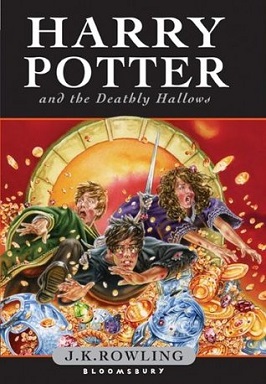Harry Potter and the Deathly Hallows: A Review in Perspective
Last night, I was up until 2 A.M. finishing reading Harry Potter and the Deathly Hallows. I knew I wouldn’t be able to sleep until I got to the end of the book, so engaging was the tale, so if I were going to lie awake wondering how it ended, I might as well stay up and finish it.
***SPOILER ALERT***
If you haven’t finished the book, bookmark this and read it later. I’ll be discussing the end at length. If you haven’t read the books or only seen the movies, stop now and go read the books. They’re a great read.
I need to preface this by explaining how I was introduced to Harry Potter. Having young daughters who love to read, my wife and I knew they’d want to read this series, so we checked the first book out from the library. We’d heard the controversy surrounding the series, so we wanted to make an informed decision as to whether they would be appropriate for our girls to read. Once we’d both read the first book, our response was, “That was a well-written fairy tale.” By the time we’d read the third book, which was the last one published at the time, we were hooked by the intricate plot and fascinating characters.
“But what about the sorcery?” Yes, God forbids sorcery in the Bible–no question about it. That said, ask a Wiccan or ancient historian about Harry Potter, and most will tell you that the sorcery in Harry Potter is, as I believe Jim said in a previous episode of our podcast, like comparing Barney to a T-Rex. Yes, there’s a definite resemblance, but they’re not the same thing. In Harry Potter’s world, wizards are born with special abilities as much as the mutants in X-Men. Those who object to Harry Potter must also object to Gandalf, Cinderella’s fairy godmother, Mary Poppins, and Sleeping Beauty to be consistent.
The other major complaint I’ve heard about Harry Potter, especially this final book, is that he’s not a very good Christ figure. And while Ms. Rowling has intimated that the book reflects her Christian beliefs, at no time has she said that the book is an allegory. It’s the difference between Narnia and Middle Earth. While Tolkien‘s beliefs are reflected in his writings, Lewis actually wrote the Narnia Chronicles to answer the question, “What if there were a world of talking animals and satyrs, and God set out to redeem that world? How would He do it?” While not an allegory, the resemblance is unmistakable. Rowling’s series falls somewhere in the middle of the two, but it leans more in the direction of Tolkien on the allegory scale. That critics have questioned the effectiveness of Harry as a Christ figure is a hostile witness to the Christian content of the series.
So objections aside, what do we find in “The Boy Who Lived”? We find the running theme throughout the series that true power is not found when we look for it, but rather is given when we need it. We find that self-sacrifice to save others is not only the height of nobility, but that upon which we all depend–the sacrifice of the One called on to save us all. And finally, that evil cannot understand love, not the emotion of affection we often confuse with love, but love in the Biblical sense–self-sacrifice. In Harry Potter, we learn that love is truly love when consciously put into action for the loved one. (Would that more divorced couples understood this before they “fell out of love”.)
These same themes are the core elements of the Bible: God’s love put into action to save His people, whether from Egypt, the Philistines, or ultimately, from ourselves and our sin. He did so by willingly sacrificing His life because it was the only way. And finally, that salvation is not something we can seek to find, but rather, that God seeks us, finds us, and gives us saving faith.
Is Harry Potter about Jesus? No. It never claimed to be. But do parts of it remind me of His great love for me and willingness to pay for my life and soul. Yes, but that’s not why I read and enjoyed the series. It was fun and engaging, and except for a study of little Teddy’s biology and a bit more on the subsequent relationship between Draco and Harry, she seems to have neatly wrapped up the plotlines. Then again, the Pensieve served as an effective plot device to explain to us what Harry wouldn’t have otherwise known. Two more movies to go, after which we look to fan fiction and hopefully “Expanded Universe” novels to get our fix. And of course, we can go back and reread them! Enjoy.
Comments welcome.


Comments
Harry Potter and the Deathly Hallows: A Review in Perspective — No Comments
HTML tags allowed in your comment: <a href="" title=""> <abbr title=""> <acronym title=""> <b> <blockquote cite=""> <cite> <code> <del datetime=""> <em> <i> <q cite=""> <s> <strike> <strong>